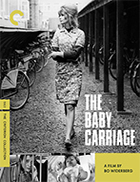The Baby Carriage (Barnvagnen)
|  The years following World War II witnessed a flurry of significant cinematic transformation all around the world in which long-standing international film industries were upended (or at least shaken) from within by surges of new talent, new ideas, and new approaches. These transformations, which took place in countries as varied as France, England, Germany, Poland, Czechoslovakia, and Japan, were initially driven by the desire to emulate the work of Italian neorealism, whose founding father, screenwriter Cesare Zavattini, argued that cinema should strive for an unvarnished realism in searching out true drama and human value in the everyday. This was not so much an aesthetic impulse as it was a moral one. For Zavattini and those who sought to follow his lead, it was the cinema’s moral responsibility to attend to reality and what was happening in the here and now. That argument was carried on more than two decades later by Swedish filmmaker Bo Widerberg, who began his career as a novelist, short story writer, and film critic before launching a broadside against his country’s film industry in 1962 with a series of articles published in the newspaper Expressen that later formed the basis of a book, Vision in Swedish Film. Similar to how Zavattini had railed against the inherent falsity of the “white telephone” films produced by the Italian film industry in the 1940s and how François Truffaut, Jean-Luc Godard, and the other French New Wave critics-turned-filmmakers railed against the prewar tradition of a French “cinema of quality,” Widerberg berated what he saw as a complacent Swedish film industry that was dominated by the mythic-poetic-spiritual cinema of Ingmar Bergman. Widerberg wanted to see Swedish films that dealt directly and honestly with current social and political realities. And that is precisely what he did with his feature debut The Baby Carriage (Barnvagnen), which he wrote and directed. It feels very much like a first feature, as it openly wears its French New Wave influences—jagged discontinuity editing, jump cuts, handheld camerawork, a jazz soundtrack—on its sleeve. Widerberg would quickly discard these New Wave flourishes in his subsequent films, but here he wields them with impunity, which at times gels with the gritty reality of the ground-level story he is telling and at other times feels like too much—a young filmmaker feeling his way through a style for which he is perhaps not all that well suited. This is not to say that The Baby Carriage is not a powerful film. Quite the opposite, it is an emotionally engaging character study of a young woman facing an uncertain future. The story is set in a drab, working-class neighborhood in Malmö, the port city where Widerberg grew up that would also be the setting for his second feature, Raven’s End (Kvarteret Korpen, 1963). Inger Taube stars as Britt Larsson, who at the beginning of the film is an insecure 18-year-old who lives at home with her parents (Ulla Akselson and Gunnar Öhlund) and younger brother (Bill Jönsson) and works in a garment factory. She has little hope of upward social and economic mobility, and while she is conventionally “liberated” in her open sexuality with her numerous boyfriends, we also get the sense that her sexuality is all she has. She becomes involved with Robban (Lars Passgård), the handsome leader of an emerging pop band, and when she gets pregnant, they decide to live together in a strained attempt to forge a family, but it all falls apart when Robban leaves. She then finds herself drawn to Björn (Tommy Berggren), a seemingly decent young man who doesn’t act bothered by her being pregnant, but secretly harbors deep resentments. Those resentments explode in one of the film’s most emotionally rending scenes, which contrasts sharply with an earlier scene in which he and Britt initially bond while listening to music together at the public library. As a social-realist drama, The Baby Carriage pulls no punches in depicting the stagnation of working-class life and the limitations placed on women. Britt is a fascinating character in the way she grows and emerges through turmoil, breaking free of the confines imposed on her by her family and society. At every turn she is faced with pressure to conform in some way, but the film’s progressive agenda insists that she can ultimately make it on her own. Widerberg harbors no illusions, though, as he refuses to present Britt’s path as a simplistic upward trajectory. Rather, it is beset with setbacks, heartbreak, and distress, and if she emerges at the end as a stronger woman with a better sense of herself and at least the possibility of making it on her own, it is no small feat and no guarantee of a better tomorrow.
Copyright © 2023 James Kendrick Thoughts? E-mail James Kendrick All images copyright © The Criterion Collection | |||||||||||||||||||||||||||||
Overall Rating: 

 (3)
(3)


 This four-disc Blu-ray set contains four films: The Baby Carriage (1963), Raven’s End (1963), Elvira Madigan (1967), and Ädalen 31 (1969).
This four-disc Blu-ray set contains four films: The Baby Carriage (1963), Raven’s End (1963), Elvira Madigan (1967), and Ädalen 31 (1969).